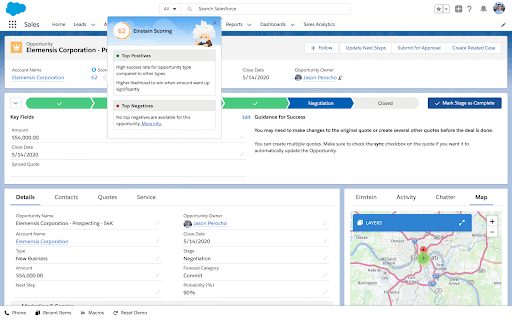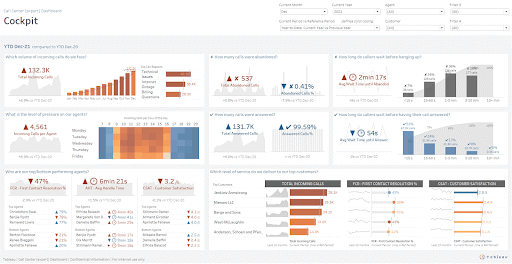7 Highly Impactful Salesforce Features to Transform your Business

Salesforce is one of the most highly effective customer relationship management (CRM) tools available today. It's uniquely capable of entirely transforming a business from the ground up — regardless of its size, shape, or the unique challenges it faces. Key Salesforce features can have a major impact on the way your business operates. Here, we take a look at seven of the most impactful features of Salesforce CRM that we've seen transform companies in practice.
Leaning on over 15 years in the tech industry, and our experience as certified Salesforce consultants, we take a look at what makes up key features of the platform and introduce assets you might have previously overlooked as being a key competitive advantage.
Of course, the sheer scale of the Salesforce platform means that there are over a hundred features from integrations, collaboration tools, and e-commerce tooling we could have chosen from. Here, however, we've chosen the seven highest-impact features we've implemented to revolutionize what a business can do in a very short space of time.
Best Salesforce Features to Revolutionise Your CRM
1. Process Automation
The number one strength that makes Salesforce stand out as an industry-leading CRM is the near limitless capabilities it has for enabling productive automation. The speed, agility, and capabilities these automatons lend to businesses make it one of the most impactful assets any CRM platform can offer.
Salesforce automation touches every part of a business's process from inventory control and management to customer interactions, sales, forecasting, lead tracking, and performance evaluation. The ability to automate business tasks across all of these areas with simple yet highly effective workflows can create efficiencies and opportunities that would be easily missed in other platforms.
Examples of crucial Salesforce automation that we have delivered for companies in the past include:
- Automated lead management. Salesforce automatons allow for web form data to be captured and formatted into your CRM without user input — saving time, eliminating errors, and guarding against lost opportunities. Extending this system further allows you to handle lead assignments, notifications, and progress tracking to handle necessary admin tasks without user input.
- Autonomously prospecting. Powerful automation tools allow teams to deliver timely personalized content to their target audience through SMS, email, and call notifications. Creating follow-up messages using automated tools is a great way to ensure you keep in touch with just the right frequency and make sure your service is at the forefront of customers' minds
- Forecasting and Reporting. Using data captured through every stage of the sales process from initial content marketing right through to customer service allows for reports and forecasts to be generated automatically. In many businesses, these have proven to be instrumental in gathering actionable insights to make notable rapid improvements.
2. Contact Management

(Source: Salesforce)
Another key Salesforce feature that companies find highly impactful is the platform's contact management tools. These allow companies to keep a complete record of their customers with all the relevant past communication, account activity, and internal notes that allow them to meet their future needs rapidly and precisely.
A valuable part of this feature is the ability to pool recent marketing campaign metrics and reactions together with customer accounts. This allows teams to view which customers are reacting most positively to any given marketing campaign at one time and which groups of customers are showing the most interest in promoted services.
The primary goal behind Salesforce contact management is to create and highlight new opportunities that can be turned into sales and service. By making contact management records easily accessible, comprehensive, and collaborative — experienced Salesforce teams meet this goal with ease.
3. Custom Daily Dashboards

(Source: Salesforce)
High-quality data dashboards are one of the most useful tools sales and service teams have today. Providing a detailed real-time performance overview, the daily dashboard contains all the key statistics and relevant data necessary to improve decision-making and increase efficiency in day-to-day tasks.
Some of the biggest boosts we can provide to businesses come from building and administering Salesforce services that provide data to where it can deliver the greatest value.
The Salesforce dashboard allows for a near-infinitely customizable selection of data and layouts that includes charts, tables, and gauges that help to inform future decisions.
Further review can help to set up filters on data and refine selections by data type, time, or events that ensures relevant key performance indicators (KPIs) are always at the forefront of thinking. Some of the most common metrics for teams to track on their Salesforce dashboards include:
- Sales volume. Analyzing the number of sales, their total value, and the average value per sale across teams.
- Conversion rates. Analyzing the number of leads that turn into sales, the number of customers that make repeat purchases, and the marketing interest that turns into actionable leads.
- Response times. For customer-facing teams, it can be helpful to track the average amount of time it takes to respond to inquiries and resolve service issues.
Understanding what performance metrics matter in the right teams and how to achieve the right setup to track them is a key development skill that influences future performance.
4. Mobile CRM Solutions
One of the key ways Salesforce helps to enhance teams today is by taking the software suite out of the desktop environment and making it available on the road. Salesforce mobile is an extremely powerful asset for sales and customer support teams that work in the field by enabling access to the same reporting data, recording tools, data dashboards, and communications that office-based teams have access to.
Mobile CRM allows users to read and update records as changes happen, collaborate with teams in real-time from the field, access securely held resources, and maintain a schedule of events while on the go.
Salesforce Mobile CRM tools are available as installable apps on Android and iOS devices or through the mobile browser across most platforms.
5. Marketing Platform Integration
Bigger data invariably creates better insights and some of the best insights your team can get will come from integrating your marketing platform with Salesforce features and services. Successful marketing integration can provide reams with a comprehensive view of customer interaction from initial interest and discovery right through to sales and customer service.
For many teams, integrating marketing efforts with sales and accounts will generate an unprecedented level of collaboration and data sharing. Invariably, the positive impact this has on customer service and lead generation is profound.
The additional level of interaction and oversight that this view enables provides ample opportunity for analysis, reporting, and automation to iteratively improve in future efforts. Data previously ungathered or ignored in more traditional solutions often becomes a competitive advantage of Salesforce software.
6. Accounting Integration
Salesforce can similarly be integrated into a business's accounting systems to provide further strategic overview over accounting and bookkeeping. Similar to contact management tools and the daily dashboards available to users, accounting integration offers secure connectivity to accounting records that can be used in real-time from anywhere.
This connection between Salesforce and accounts can further improve reports and analysis by offering cash flow projections that link together closed sales, customer payments, and open accounts. The combination allows for accurate forecasts and analysis that will provide the opportunity to plan long into the future.
7. Custom Data Objects
One of the most innovative tools Salesforce has at its disposal is the ability to develop and store custom data objects specific to your business requirements. These allow you to model your business digitally with a high degree of accuracy that reflects its internal relationships. A business's custom data can be readily integrated into Salesforce and third-party solutions through the comprehensive Salesforce API available to developers.
Custom objects provide complete control of your digital assets, allowing you to represent anything your business owns while still maintaining access to your data through standard Salesforce dashboards and analysis.
High-Impact Salesforce Features
Unlimited customization and control are two of the most impactful things when it comes to Salesforce solutions. From daily dashboards tailored to the requirements of a business to reports and analyses that draw from marketing, sales, accounting, and customer service data — Salesforce CRM allows you to build a solution that meets your requirements precisely.
Well-built integrations between Salesforce CRM, marketing, and accounting tools provide the data and analysis necessary to revolutionize your approach to maintaining business relationships. The ability to access and report on these relationships in real-time through a mobile platform alone has proven to be a game-changing shift in many modern businesses.
Our team of Salesforce professionals has the knowledge and experience to create a lasting Salesforce solution that works for your organization. Whether extending your in-house team with Salesforce expertise or outsourcing Salesforce management to ensure a performant bespoke solution, simply get in touch to let us know how Salesforce can impact your business relationships.


